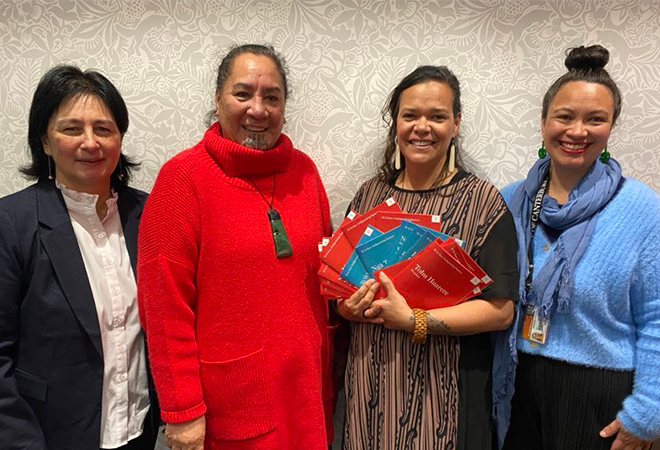
Ki te hoe | Indigenising Spaces – Preparing teaching spaces in using and teaching te reo Māori
Project Details
Ki te hoe – Indigenising Spaces offers a set of 17 te reo Māori resource pukapuka (books) for Aotearoa New Zealand’s Teaching Profession.
These resources have been developed as a te reo Māori language planning pathway to support all kaiako/teachers across all sectors in achieving the te reo me ngā tikanga Māori competency towards obtaining, or the renewal of, a NZ Teaching Practice Certificate.
Ki te hoe – Indigenising Spaces (Williams, Dayman, Jones, Cowie, 2024) expands upon the 2023 resources Ki te hoe – Indigenising Practice (Williams), which were primarily designed for the Early Childhood Education sector.
Project team:
All authors are from the School of Teacher Education, Faculty of Education, the University of Canterbury.
 Dr Ngaroma M. Williams | Project Leader
Dr Ngaroma M. Williams | Project Leader
Ngāti Whakaue, Ngāti Kahu Upoko, Tūhourangi, Ngāti Raukawa ki Wharepūhunga, Ngāti Awa.
– Pūkenga Matua/Senior Lecturer | Early Childhood/Primary ITE and Postgraduate Programmes
 Dr Tracy Dayman
Dr Tracy Dayman
Ngāi Tūhoe
– Pūkenga/Lecturer | Early Childhood, Primary, Mātauranga Māori ITE and Post Graduate Programmes
 Dr Kay-Lee Jones
Dr Kay-Lee Jones
Te Aitanga a Māhaki, Ngāti Porou, Te Whānau a Kai, Te Whakatōhea
– Pūkenga Matua/Senior Lecturer | Primary, Mātauranga Māori ITE Programmes
 Rāhera Cowie
Rāhera Cowie
Ngāpuhi, Ngāi Tahu
– Pūkenga/Lecturer | Primary, Mātauranga Māori ITE Programmes
Key Points to Note:
- These books have been designed to support all teachers in English-medium settings and schools to strengthen their learning and use of te reo Māori as an everyday language of instruction.
- Te reo Māori competence is a professional responsibility of all teachers across all sectors in Aotearoa New Zealand.
- The resources contain ngā huinga reo –vocabulary lists and ngā rerenga - sentence structures for Levels 1 to 3 of Te Aho Arataki Marau (Ministry of Education, 2009), the recommended teaching and learning te reo Māori curriculum.
- Integral to each pukapuka is a te reo Māori learning plan that supports teachers to navigate each of the 17 pukapuka, adding to their own te reo Māori pātaka (repertoire of te reo words and phrases) for implementation as a daily language of instruction.
- These resources are also a valuable tool for parents and grandparents to learn te reo Māori alongside of their tamariki (children) and mokopuna (grandchildren).
This set of 17 te reo Māori resource books have been developed to assist New Zealand’s Teaching Profession towards meeting up to Level 3 of Te Aho Arataki Mārau – the teaching and learning te reo Māori in English medium settings (Years 1–13).
- 14 June 2024
This pukapuka (book) provides a generic overview of what Te Arapū Māori (the Māori alphabet) consists of and some pronunciation directions have been included to guide your engagement as a learner of te reo Māori.
- 14 June 2024
This book provides a range of te reo Māori kupu (words) and also rerenga kōrero (phrases) associated with ngā mihi (greetings and farewells).
- 14 June 2024
This book provides a range of te reo Māori kupu (words) and rerenga kōrero (phrases) associated with colours.
- 14 June 2024
This book provides a range of te reo Māori kupu (words) and rerenga kōrero (phrases) associated with huarākau (fruit), huawhenua (vegetables) and kaute mai (counting).
- 14 June 2024
This book provides a range of te reo Māori kupu (words) and rerenga kōrero (phrases) associated with ngā rā o te wiki (days of the week) and ngā marama o te tau (months of the year).
- 14 June 2024
This book provides a range of te reo Māori kupu (words) and rerenga kōrero (phrases) associated with Ngā Mihi Whakanui or Ngā Mihi Akiaki – Praises.
- 14 June 2024
This book provides a range of te reo Māori kupu (words) and rerenga kōrero (phrases) associated with Ngā Kupumahi (Actions).
- 14 June 2024
This book provides a range of te reo Māori kupu (words) and rerenga kōrero (phrases) associated with ngā kare-ā-roto (emotions and feelings).
- 14 June 2024
This book provides a range of te reo Māori kupu (words) and rerenga kōrero (phrases) associated with Tohu Huarere (Weather).
- 14 June 2024
This book provides a range of ‘Ngā Mea Pai – Kāore e Pai’ (likes and dislikes) examples in te reo Māori to support your growing proficiency.
- 14 June 2024
This book provides a range of te reo Māori kupu (words) and rerenga kōrero (phrases) associated with introductions.
- 14 June 2024
This book provides a range of te reo Māori kupu (words) and rerenga kōrero (phrases) associated with Ngā Tūwāhi – Locatives
- 14 June 2024
This book provides a range of te reo Māori kupu (words) and rerenga kōrero (phrases) associated with Te reo Māori i te whare kōhungahunga | Māori language for the ECE setting.
- 14 June 2024
This book provides a range of te reo Māori kupu (words) and rerenga kōrero (phrases) associated with the classroom.
- 14 June 2024
This book provides a range of wetewete reo (grammar) examples in te reo Māori to support your growing proficiency.
- 14 June 2024
This book provides a range of wetewete reo (grammar) examples pertaining to tūkapi riro (possessive pronouns) to support your growing proficiency.
- 14 June 2024
This book provides a range of te reo Māori kupu (words) and rerenga kōrero (phrases) associated with negating ‘nominal sentences ie: ‘this is not – or these are not’ and covers how people travel.
- 14 June 2024
A project to explore the bicultural competence of early childhood teachers within Aotearoa-New Zealand and develop bicultural teaching and learning tools for New Zealand early childhood teachers.
Project
Ki Te Hoe: Indigenising Practice
A project that focusses on honouring indigeneity within the mandated bicultural early childhood curriculum Te Whāriki (Ministry of Education, 1996, 2017).